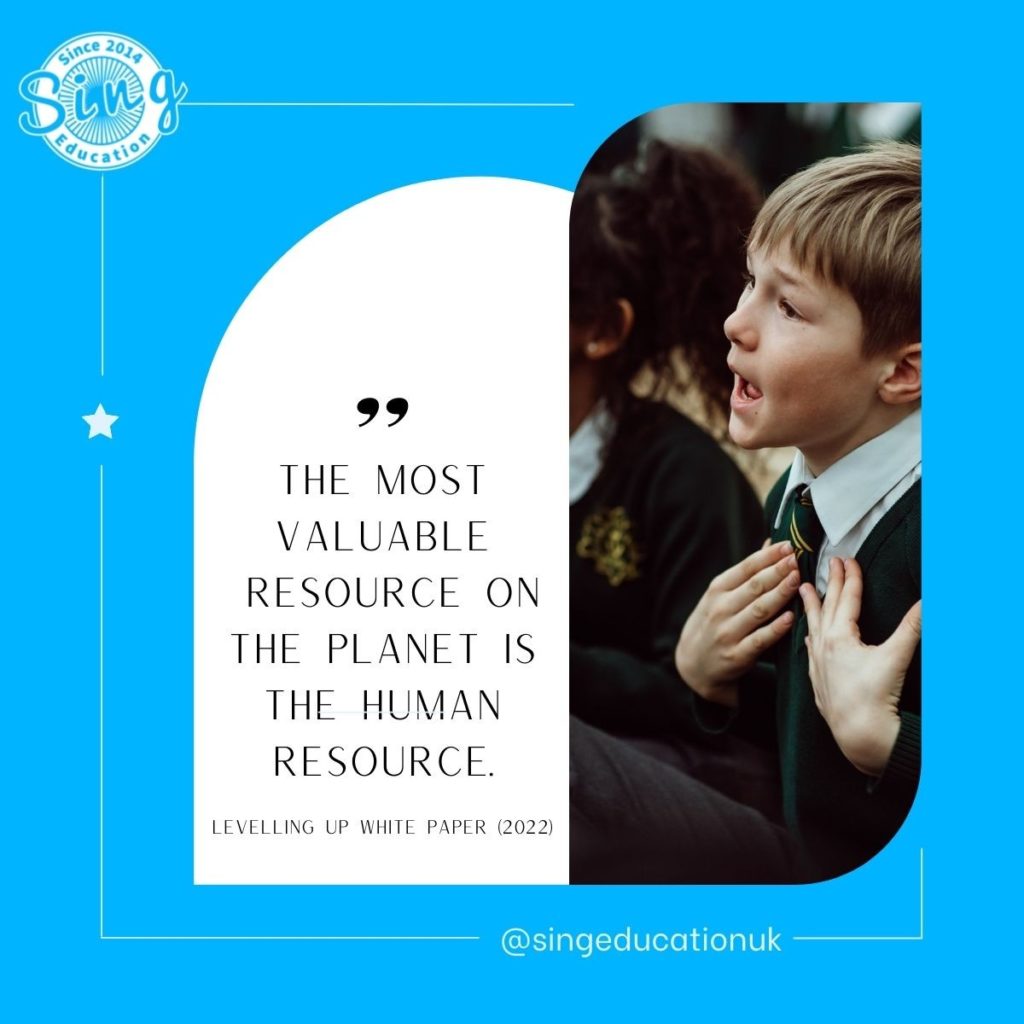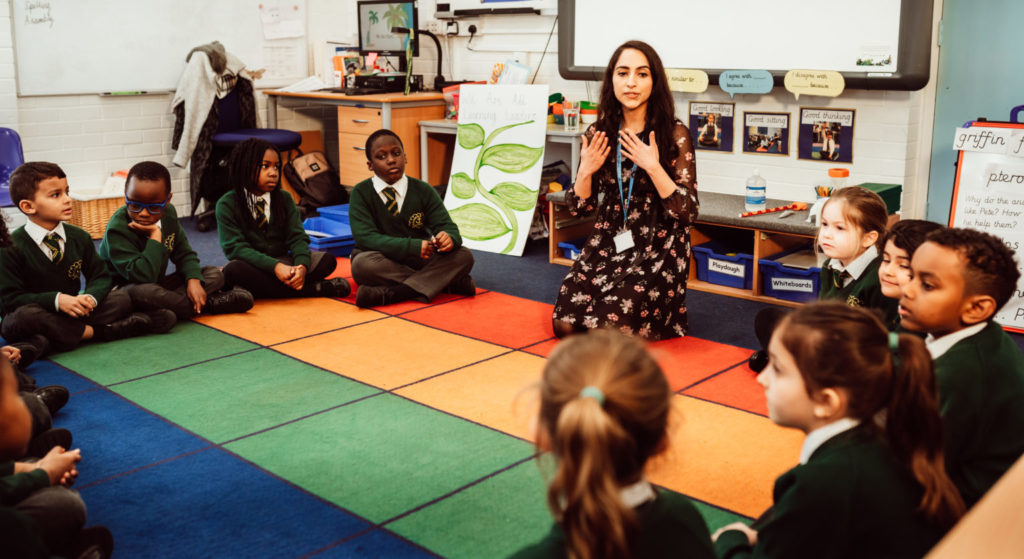
Sing Education is bringing you a three-part series looking at the Government’s white paper in depth:


This Spring marked the release of the seminal Government white paper entitled, “Levelling Up the United Kingdom.” Setting forth an ambitious agenda for boosting economic growth, shoring up the nation’s cultural institutions and putting advanced skills and better primary education within the reach of millions, the 332-page document has generated quite a lot of conversation, and some would also say, controversy.
Produced by the Department for Levelling Up, Housing and Communities (DLUHC), some of the most vocal critics have objected to the outsize nature of key policy objectives, the lack of clear evaluation metrics, as well as general ambiguity around the white papers’ policy delivery timetable and roadmap.
But whether critic or supporter, it’s clear that UK educators, as well as local councillors, community leaders and school partisans – notably, parents, governors and academy trust executives – need to understand the key tenets of this important piece of work.
That’s why Sing Education is bringing you a three-part series looking at the Government’s white paper in depth:
And with these broad stroke questions resolved, we’ll dive deeper into the two areas that mean the most to our clients and partners – how the new measures impact education and the arts, as well as the government’s financial commitment to supporting the same.



Why change? Why now?
The UK, in many ways, is an unparalleled success story – brimming with diversity, prosperity and optimism. And this assessment holds up not only when we’re compared to less advanced economies around the globe but also when we’re compared to similar Western European nations.
And though the Scandinavian nations might be considered among the happiest on earth, Great Britain certainly has many other achievements about which to boast.
As affirmed by the DLUHC, the UK is “a multi-cultural, multi-national, multi-ethnic state with the world’s best broadcaster, a vibrantly creative arts sector [and] a National Health Service which guarantees care for every citizen.”
In addition, we have “charities and voluntary groups which perform a million acts of kindness daily, globally renowned scientists extending the boundaries of knowledge every year, [and] entrepreneurs developing the products and services which bring joy and jobs to so many.”
So what’s our biggest driver for change?
Inequality.
As articulated by the DLUHC, opportunity in the UK isn’t like runny honey on one’s breakfast toast. Smooth and evenly distributed.
Instead it’s much more like crunchy peanut butter – lumpy in certain bits, creamy in others. Or in a word, uneven.
“Not everyone shares equally in the UK’s success. While talent is spread equally across our country, opportunity is not. Levelling up is a mission to challenge, and change, that unfairness. Levelling up means giving everyone the opportunity to flourish. It means people everywhere living longer and more fulfilling lives, and benefitting from sustained rises in living standards and well-being.” (Department for Levelling Up, Housing and Communities)

We are a nation where regional patterns of economic growth, educational attainment and cultural access have become further and further bifurcated from the standards enjoyed by our capital.
And adding to the complexity of the situation, everything from where we get our tomatoes (transport and logistics), to where we take our summer holidays (globalisation and culture), to what careers we choose (the shift from heavy industry to knowledge work), are driven by trends in globalisation, culture and technology which pay no respect to local borders or geographies.
“Over the past century, many trends have combined to create the spatial patterns seen across the UK today. Globalisation, technological progress, advances in transport, logistics and power, and the shift from heavy industry to knowledge-intensive sectors, as well as the rise of foreign holidays and shift from technical training to university education, have had a large and lasting impact on the economic geography of the UK.” (Department for Levelling Up, Housing and Communities)
That’s why the Government took the bold step to outline 12 key areas on which to focus over the next decade to better ensure our future and to address the widening divide between regions marked by prosperity and those marked by disadvantage.
So let’s take a look at the key policy agenda items outlined in the Levelling Up white paper. You’ll note that they’re organised around four guiding principles:
These principles or goals are then broken down further into twelve areas of focus, with associated mission objectives.



Here’s an overview to guide your understanding…
Mission 1 – Living Standards
Mission 2 – Research & Development (R&D)
Mission 3 – Transport Infrastructure
Mission 4 – Digital Connectivity
Mission 5 – Education
Mission 6 – Skills
Mission 7 – Health
Mission 8 – Well-being
Mission 9 – Pride in Place
Mission 10 – Housing
Mission 11 – Crime
Mission 12 – Local Leadership

![]() Click here for Part II of the Government’s Bold Plans for Levelling Up Culture & Education,
Click here for Part II of the Government’s Bold Plans for Levelling Up Culture & Education,![]() where we’ll examine how a new mechanism for school funding, the launch of a National Academy, the introduction of 55 new Education Investment Areas (EIAs) and the rollout of ambitious new targets for literacy and numeracy will impact students, educators and MAT executives across the UK.
where we’ll examine how a new mechanism for school funding, the launch of a National Academy, the introduction of 55 new Education Investment Areas (EIAs) and the rollout of ambitious new targets for literacy and numeracy will impact students, educators and MAT executives across the UK.
………………………………………………………………………………………..
Founded in 2014 and serving more than 9,000 children each week, Sing Education is a first class provider of primary school music education. Focusing on high-quality, singing-led tuition, we deliver a complete solution for schools which includes teacher recruitment, training and management, bespoke curricular resources and educational consultancy services.
Through music lessons, singing assemblies, choirs, after school clubs and instrumental tuition, Sing Education works with students from Nursery right through to Year 6. Our core philosophy is that “Every Child Has A Voice,” and, as educators active in the classroom, our directors and teachers know firsthand how much young learners benefit from exciting, rewarding music education. singeducation.co.uk/schools
#SingEducation #MusicChangesLives
Sources:
Levelling Up the United Kingdom: Executive Summary DLUHC
Levelling Up the United Kingdom White Paper DLUHC
